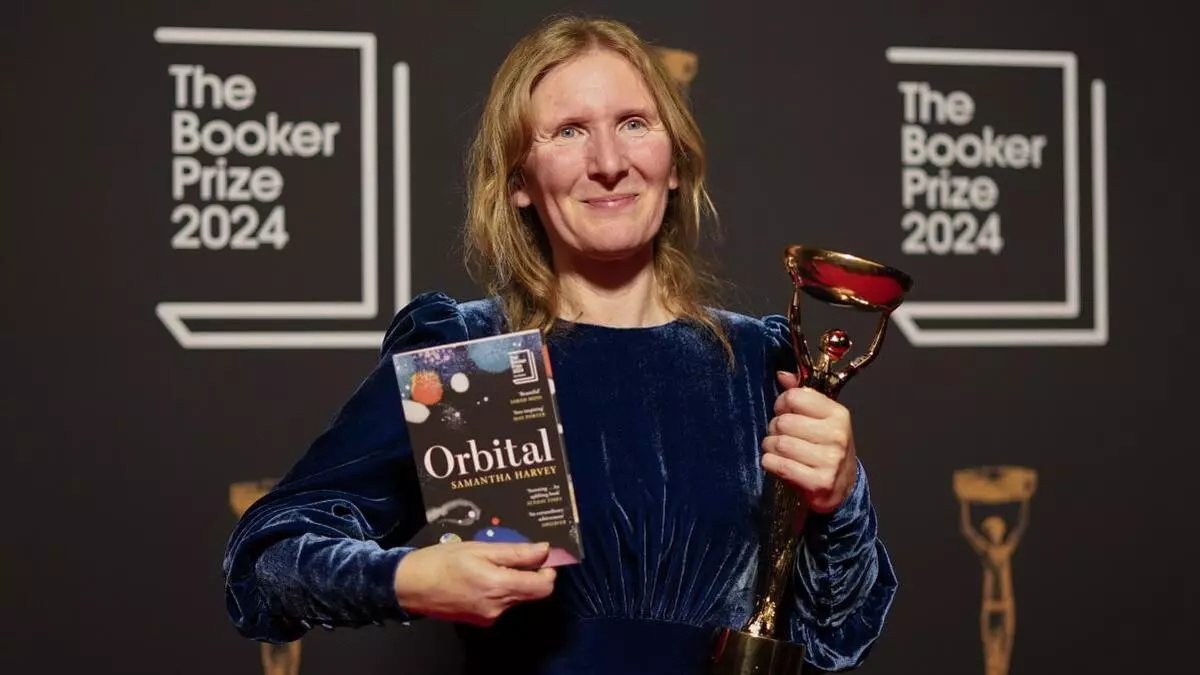Booker Prize 2024: British Writer Samantha Harvey Wins For Space Novel ‘Orbital’

On November 12, 2024, in London, Samantha Harvey stands proudly with her trophy and her book "Orbital" after being awarded the Booker Prize for 2024. | Photo Credit: AP
On November 12, British author Samantha Harvey received the Booker Prize for her novel *Orbital*. This enchanting and concise book, set on the International Space Station, reflects on the delicate beauty of our planet.
Harvey received a prize of £50,000 ($64,000) for her work, which she refers to as a “space pastoral.” It tells the story of six astronauts in orbit, a project she started during the lockdowns of the COVID-19 pandemic. The characters are enclosed together, experiencing 16 sunrises and 16 sunsets within a single day, captivated by the constantly shifting views of Earth from above.
"Seeing the Earth from space is akin to a child glancing into a mirror and discovering for the first time that the reflection is her own," explained Harvey, who prepared for her novel by studying astronauts' books and observing live footage from the space station. "Our actions towards the Earth reflect back on us."
She mentioned that while the novel isn't directly focused on climate change, it does subtly convey the reality of human-induced climate change through its portrayal of the planet.
Check out this related article: Could the International Booker Prize victory for ‘Tomb of Sand’ have a significant impact on Indian language authors?
She dedicated the award to those who advocate for the Earth and support the dignity of all people and living beings. “This is for everyone who speaks up, calls for, and strives for peace—this is for you,” she stated.
"Timely, Timeless, And Filled With Hope"
Edmund de Waal, a writer and artist who led the five-member jury, described "Orbital" as a "remarkable novel" that offers us a fresh and unusual perspective on our world. The panel also featured renowned British Indian musician Nitin Sawhney, author Sara Collins, Justine Jordan, fiction editor at The Guardian, and Yiyun Li, a Chinese American writer and professor.
Gaby Wood, the CEO of the Booker Prize Foundation, pointed out that in a year filled with global challenges and one that is expected to be the hottest on record, the book that won the award is both “hopeful, relevant, and enduring.”
Harvey, an author with four novels and a memoir about insomnia to his name, has become the first British author to win the Booker Prize since 2020. This award is available to writers of any nationality who write in English and is known for significantly changing the course of an author’s career. Notable past recipients include Ian McEwan, Margaret Atwood, Salman Rushdie, and Hilary Mantel.
With only 136 pages, the book that won the award is the second shortest title to receive this honor. It also spans the shortest duration of any title in the running, unfolding the story over a mere 24-hour period.
De Waal mentioned that the judges dedicated an entire day to selecting their top choice and ultimately reached a unanimous decision. Harvey was selected as the winner among five other finalists from Canada, the US, Australia, and the Netherlands, all of whom were chosen from a pool of 156 novels submitted by various publishers.
"Just The Novel: No Agendas Involved"
American author Percival Everett was the top pick among bookmakers for winning with his novel, which offers a fresh perspective on Mark Twain's Huckleberry Finn through the eyes of Jim, the main Black character and an enslaved man.
The remaining finalists included "Creation Lake," a spy tale by American author Rachel Kushner; "Held," a lyrical novel by Canadian writer Anne Michaels; "Stone Yard Devotional," an epic from Australian author Charlotte Wood; and "The Safekeep" by Yael van der Wouden, who is the first Dutch writer to receive a shortlist nod for the Booker Prize.
Harvey is the first woman to win the Booker Prize since 2019, and she is among five women on this year's shortlist—the highest representation of women in the award’s 55-year history. De Waal commented that factors like the authors' gender or nationality were merely "background noise" and did not affect the judges' decisions.
“There was no concern over meeting quotas or hidden motives of any kind. It was purely about the book,” he stated prior to the awards ceremony at Old Billingsgate, a magnificent former Victorian fish market located in central London.
Check out this related article: In her Booker Prize-winning novel "Kairos," Jenny Erpenbeck presents a viewpoint from East Germany.
Established in 1969, the Booker Prize is awarded to novels that are originally written in English and released in the UK or Ireland. The winner from last year was Paul Lynch, an Irish author, for his dystopian novel, Prophet Song, which explores a post-democratic society.
At the ceremony, Lynch presented Harvey with her Booker trophy, cautioning her that the recognition would significantly alter her life due to the surge in publicity. Following its win, Prophet Song experienced a staggering 1,500 percent rise in sales within just one week. Over the past year, sales of the English-language version of the book have risen by over 500,000 copies, bringing the total sales across all formats to over 560,000 copies globally.
Harvey mentioned that she felt “overwhelmed” but stayed practical about how to use her prize money. She stated she would set aside “a portion for taxes. I’d like to get a new bike. And then with the remainder, I want to travel to Japan.”
(with contributions from various agencies)













































